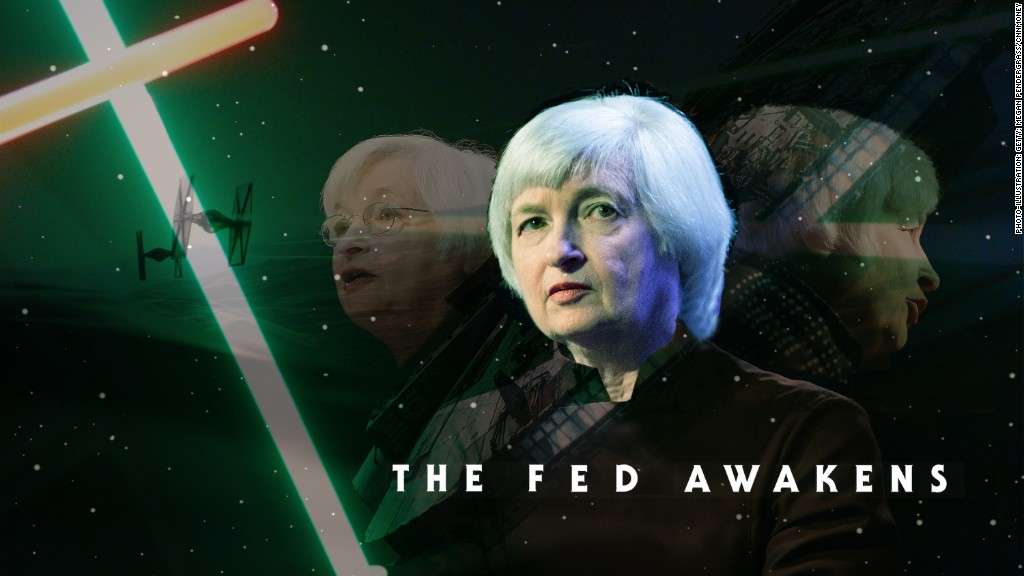
A major junk bond mutual fund shut down last week. And that has many investors wondering if the risky high yield debt market could be about to collapse ... and drag the stock market down with it like subprime mortgages did in 2008.
The Third Avenue Focused Credit Fund announced it was liquidating and that it was blocking investors from taking money out of the fund. Third Avenue's CEO lost his job as a result.
And there are reports that two hedge funds, Stone Lion Capital and Lucidus Capital, have also shut down junk bond funds in recent days. Representatives from both funds were not immediately available for comment.
Investors are scared. Junk bond demand is one of seven indicators in CNNMoney's Fear & Greed Index. And it's showing signs of Extreme Fear.
Two high-yield bond exchange-traded funds -- the iShares iBoxx $ High Yield Corporate Bond (HYG) and SPDR Barclays High Yield Bond ETFs (JNK) -- each fell about 3% in the past two trading days on extremely heavy volume.
But both funds bounced back on Tuesday though ... along with the broader market.
Related: Third Avenue CEO exits after mutual fund implodes
So is the junk bond crisis already over? No.
And hopefully Federal Reserve chair Janet Yellen won't make the same mistake her predecessor did and say that the problems in high-yield are "likely to be contained." Ben Bernanke infamously said that about subprime mortgages in 2007.
But several fixed income experts said this isn't 2008 all over again either.
Brian Battle, director of trading at Performance Trust Capital Partners, thinks more junk bond funds are in danger of going under -- especially ones with exposure to risky short-term bank loans and energy company debt.
He adds that we're just at the beginning of a pickup in corporate bond defaults.
"Third Avenue had a lot of non-liquid, toxic stuff that you just couldn't sell." Battle said. "And the high yield market has been selling off for awhile. There's never just one cockroach."
But if there is a silver lining from the Third Avenue Freeze-Out (not to be confused with Springsteen's Tenth Avenue one) it's that it wasn't a complete shock. Investors did seem to be anticipating pain in the high-yield market before last week.
Both big junk bond ETFs are down more than 10% year-to-date and investors really started to sell high-yield assets in earnest this summer when fears about the economic slowdown and market volatility in China first surfaced.
Related: Investors brace for a wave of defaults in the oil patch
Anthony Valeri, fixed income investment strategist with LPL Financial, said junk bonds typically get killed during times of heightened market volatility. So the recent turmoil should not be a huge surprise.
"This goes beyond energy. Energy is a part of it," Valeri said. "But when China worries first popped up in July, the high-yield market was the first sector that got hurt."
Junk bonds are by their very nature among the riskiest bonds you could buy. That's why the yields are so high -- it's a tempting reward for assuming the possible risk of default.
Of course, there's a big difference between a bond fund underperforming and actually closing up shop and barring investors from taking money out. That's what so scary about Third Avenue.
"What Third Avenue did is stuff we haven't seen since the 2008 crisis," Battle said.
Still, Valeri thinks the comparisons to Bear Stearns and Lehman Brothers are overblown. The big losers from these funds imploding should be the investors in those funds -- not big banks and insurers.
"2008 fears are overdone. The main difference here is that the funds that have frozen redemptions are not leveraged. So there's no major exposure for the financial sector," he said.
The Federal Reserve may also wind up stabilizing the high-yield market if it does what everyone expects on Wednesday -- raise rates and signal that future rate hikes in 2016 will be small and gradual.
Related: Defaults soar to recession levels, fueled by cheap oil
"There is the possibility of calmer waters once the Fed rate hike is out of the way," said John Canavan, fixed income strategist with Stone & McCarthy Research Associates. "And if the economy shows moderate strength, the market should stabilize in 2016."
Still, the high-yield market will probably remain extremely volatile for awhile -- even if the Fed raises rates and oil prices rebound.
"The concerns so far are about a small subset of the high-yield market, but the risk is that it is a harbinger of broader weakness that hasn't fully shown itself yet," Canavan said.
And the biggest lesson for investors is that you have to know what you own. Don't get seduced by high yields and forget that these bonds are called junk for a reason. And it's no secret that oil companies are struggling due to the massive plunge in crude prices.
"If you can't tolerate risk and you own a high-yield energy fund, it's your own fault," Battle said. "It's not like you couldn't have seen this coming."


